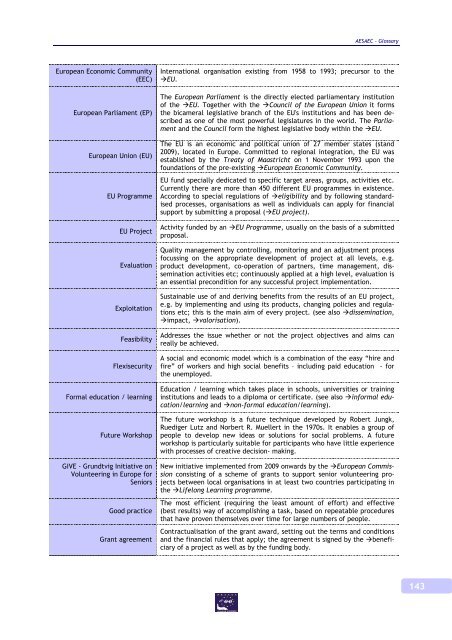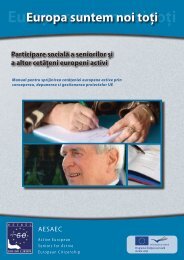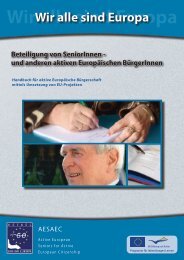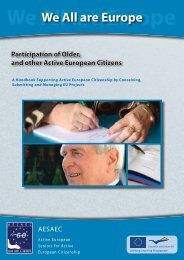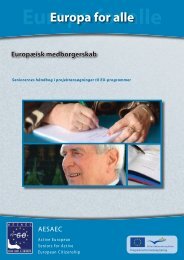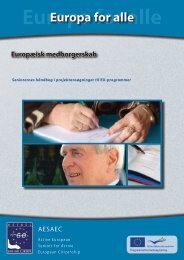We All are Europe - AESAEC
We All are Europe - AESAEC
We All are Europe - AESAEC
You also want an ePaper? Increase the reach of your titles
YUMPU automatically turns print PDFs into web optimized ePapers that Google loves.
<strong>AESAEC</strong> – Glossary<br />
<strong>Europe</strong>an Economic Community<br />
(EEC)<br />
<strong>Europe</strong>an Parliament (EP)<br />
<strong>Europe</strong>an Union (EU)<br />
EU Programme<br />
EU Project<br />
Evaluation<br />
Exploitation<br />
Feasibility<br />
Flexisecurity<br />
Formal education / learning<br />
Future Workshop<br />
GIVE - Grundtvig Initiative on<br />
Volunteering in <strong>Europe</strong> for<br />
Seniors<br />
Good practice<br />
Grant agreement<br />
International organisation existing from 1958 to 1993; precursor to the<br />
EU.<br />
The <strong>Europe</strong>an Parliament is the directly elected parliamentary institution<br />
of the EU. Together with the Council of the <strong>Europe</strong>an Union it forms<br />
the bicameral legislative branch of the EU's institutions and has been described<br />
as one of the most powerful legislatures in the world. The Parliament<br />
and the Council form the highest legislative body within the EU.<br />
The EU is an economic and political union of 27 member states (stand<br />
2009), located in <strong>Europe</strong>. Committed to regional integration, the EU was<br />
established by the Treaty of Maastricht on 1 November 1993 upon the<br />
foundations of the pre-existing <strong>Europe</strong>an Economic Community.<br />
EU fund specially dedicated to specific target <strong>are</strong>as, groups, activities etc.<br />
Currently there <strong>are</strong> more than 450 different EU programmes in existence.<br />
According to special regulations of eligibility and by following standardised<br />
processes, organisations as well as individuals can apply for financial<br />
support by submitting a proposal (EU project).<br />
Activity funded by an EU Programme, usually on the basis of a submitted<br />
proposal.<br />
Quality management by controlling, monitoring and an adjustment process<br />
focussing on the appropriate development of project at all levels, e.g.<br />
product development, co-operation of partners, time management, dissemination<br />
activities etc; continuously applied at a high level, evaluation is<br />
an essential precondition for any successful project implementation.<br />
Sustainable use of and deriving benefits from the results of an EU project,<br />
e.g. by implementing and using its products, changing policies and regulations<br />
etc; this is the main aim of every project. (see also dissemination,<br />
impact, valorisation).<br />
Addresses the issue whether or not the project objectives and aims can<br />
really be achieved.<br />
A social and economic model which is a combination of the easy “hire and<br />
fire” of workers and high social benefits – including paid education - for<br />
the unemployed.<br />
Education / learning which takes place in schools, universities or training<br />
institutions and leads to a diploma or certificate. (see also informal education/learning<br />
and non-formal education/learning).<br />
The future workshop is a future technique developed by Robert Jungk,<br />
Ruediger Lutz and Norbert R. Muellert in the 1970s. It enables a group of<br />
people to develop new ideas or solutions for social problems. A future<br />
workshop is particularly suitable for participants who have little experience<br />
with processes of creative decision- making.<br />
New initiative implemented from 2009 onwards by the <strong>Europe</strong>an Commission<br />
consisting of a scheme of grants to support senior volunteering projects<br />
between local organisations in at least two countries participating in<br />
the Lifelong Learning programme.<br />
The most efficient (requiring the least amount of effort) and effective<br />
(best results) way of accomplishing a task, based on repeatable procedures<br />
that have proven themselves over time for large numbers of people.<br />
Contractualisation of the grant award, setting out the terms and conditions<br />
and the financial rules that apply; the agreement is signed by the beneficiary<br />
of a project as well as by the funding body.<br />
143


